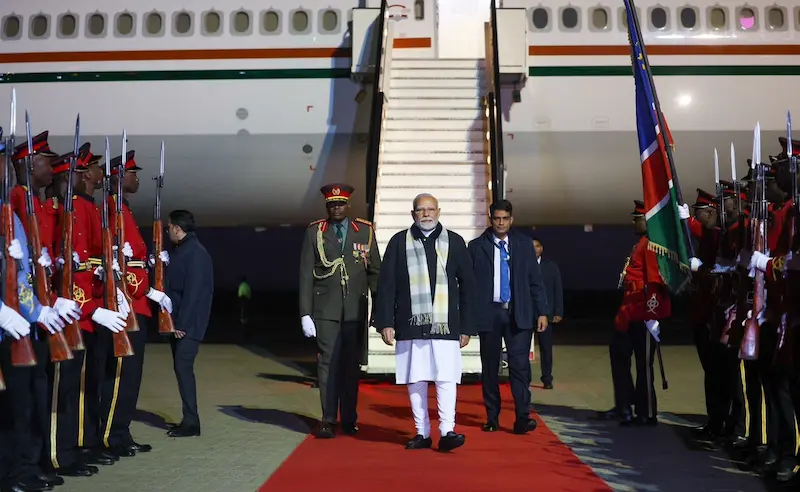
Prime Minister Narendra Modi’s landmark visit to Namibia marks a turning point in India-Africa relations
A Ceremonial Welcome That Echoed Across Continents
Modi’s Triumph in Namibia – As PM Modi’s aircraft touched down at Hosea Kutako International Airport in Windhoek on July 9, 2025, the atmosphere was electric. Greeted by Namibian President Netumbo Nandi-Ndaitwah, Modi was accorded a full ceremonial welcome, complete with a guard of honour, traditional music, and cultural performances that blended African rhythms with Indian motifs.
The most striking moment came when Modi played traditional Namibian drums, a spontaneous gesture that resonated deeply with locals and symbolized India’s respect for African heritage. The video of Modi tapping into the beat of Namibia went viral, capturing the spirit of cultural diplomacy at its finest.
The airport was adorned with Indian and Namibian flags, and the Indian diaspora turned out in large numbers, waving tricolours and chanting slogans of unity. Children presented handmade posters, and Modi paused to greet them, visibly moved by their warmth.
At the State House, the official residence of the Namibian President, Modi was welcomed with a vibrant cultural showcase featuring tribal dances, folk music, and a fusion performance that blended Indian classical instruments with African percussion. The symbolism was clear: India and Namibia are not just diplomatic partners—they are cultural allies.
Strategic Dialogues: Minerals, Energy and Defense on the Table
Modi’s visit wasn’t just ceremonial, it was strategically loaded. Namibia is rich in critical minerals like uranium, lithium, and rare earth elements, which are essential for India’s clean energy transition, electric vehicle ambitions, and semiconductor manufacturing.
Key Strategic Interests:
- Uranium Diplomacy: India is reviving its 2009 uranium supply agreement with Namibia to fuel its expanding civilian nuclear program.
- Energy Collaboration: Recent oil and gas discoveries in Namibia have attracted Indian interest for long-term energy security.
- Defense Procurement: Namibia is exploring Indian defense equipment and capacity-building programs, including officer-level training.
- Digital Infrastructure: India’s UPI system is being rolled out in Namibia, making it one of the first African nations to adopt India’s fintech model.
India’s High Commissioner to Namibia, Rahul Shrivastava, described the visit as a “reaffirmation of trust” and emphasized India’s role as a key partner in the Global South.
Talks are also underway for a potential “Project Cheetah 2,” building on the successful translocation of cheetahs from Namibia to India in 2022. Modi’s visit is expected to pave the way for more wildlife conservation collaborations.
Africa Matters: The Bigger Picture of India’s Foreign Policy
Modi’s Namibia visit is the final leg of a five-nation tour that included Ghana, Trinidad & Tobago, Argentina, and Brazil. This tour reflects India’s evolving foreign policy, one that prioritizes South-South cooperation, resource diversification, and multilateral reform.
Why Africa Is Central to India:
- Geopolitical Leverage: Africa’s strategic location and voting power in global forums like the UN and G20 make it a vital ally.
- Economic Opportunity: Africa’s young population and growing markets offer immense potential for Indian exports, investments, and tech partnerships.
- Historical Solidarity: India was among the first nations to support African liberation movements, and that legacy continues to shape diplomatic goodwill.
- Climate and Conservation Diplomacy: From solar energy projects to wildlife conservation, India is positioning itself as a responsible partner in Africa’s sustainable development.
India’s approach is distinct it’s non-extractive, inclusive, and future-focused. Unlike traditional powers, India emphasizes capacity building, technology transfer, and mutual respect.
Modi’s address to the Namibian Parliament is expected to highlight this ethos, reinforcing India’s commitment to a shared future with Africa.
Historical Ties: A Legacy of Solidarity and Support
India and Namibia share a rich history of solidarity. India was one of the first countries to raise the issue of Namibian independence at the United Nations in 1946. During Namibia’s liberation struggle, India provided material assistance, military training, and diplomatic support.
Lieutenant General Dewan Prem Chand of the Indian Army headed the UN peacekeeping force (UNTAG) deployed in Namibia from 1989 to 1990. After independence, India upgraded its Observer Mission to a full-fledged High Commission in Windhoek.
Namibia’s founding father, Dr. Sam Nujoma, visited India 11 times and wrote in his autobiography about India’s vital role in supporting SWAPO’s liberation efforts. Modi’s visit included a solemn tribute at Heroes Acre, where he paid homage to Dr. Nujoma, a powerful reminder of India’s enduring support.
Economic Diplomacy: Trade, Tech, and Investment
India-Namibia trade stood at USD 813 million in 2023-24, with Indian exports amounting to USD 453 million. The two nations are now exploring a Preferential Trade Agreement (PTA) and expanding cooperation in sectors like:
- Mining and Infrastructure
- Health and Education
- Agriculture and Renewable Energy
- Digital Governance and Cybersecurity
India has also gifted Namibia with helicopters, vaccines, and food aid during times of crisis. The India-Namibia Centre of Excellence in IT (INCEIT) and the rollout of UPI are examples of India’s commitment to digital empowerment.
Modi’s Message: A Vision for the Global South
In his statement before departing for Namibia, Modi said:
“Namibia is a valued and trusted African partner with whom we seek to boost bilateral cooperation. I look forward to charting a new roadmap for cooperation for the benefit of our peoples, our regions, and the wider Global South.”
This visit isn’t just about bilateral ties, it’s about India’s leadership in the Global South, and its role in shaping a more equitable world order. Namibia participated in all three Voices of Global South Summits chaired by India under its G20 presidency. Modi’s visit reinforces that India sees Africa not as a recipient of aid, but as a co-author of global solutions.
Modi’s Global Gambit: 5-Nation Tour Signals India’s Rise as a Strategic Powerhouse